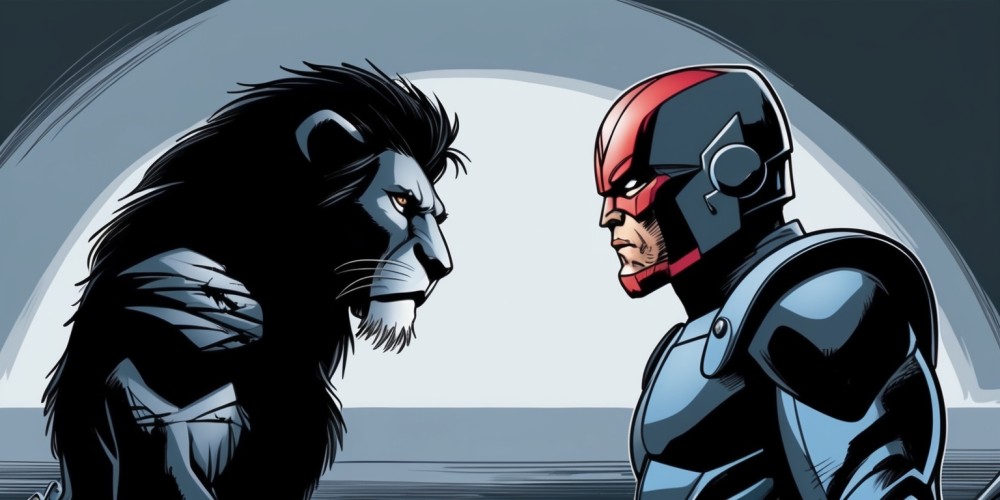Shades of Vengeance: Exploring the Anti-Hero Journeys of Scar and Magneto
Dec-16-2024

In the vast landscape of modern storytelling, the rise of anti-heroes has captivated audiences as they navigate the murky waters of morality. These characters, who embrace unconventional ethics and blurred lines between right and wrong, provide rich narratives that challenge our understanding of justice. One such figure is Scar from Fullmetal Alchemist, whose compelling backstory and motivations draw striking parallels with Magneto from the X-Men series. Through the lens of Hiromu Arakawa's skillful writing, we explore how Scar embodies the central conflicts of vengeance, moral ambiguity, and the quest for identity amidst chaos.
Scar’s Origins Unveiled
Scar’s narrative is steeped in tragedy, originating from the traumatic experiences of the Ishvalan Civil War. This harrowing conflict, characterized by brutal oppression by the Amestrian Military, decimated his home and left him with deep psychological scars. The violent loss of his family and community instilled in Scar an insatiable thirst for revenge, considerably shaping his path in Fullmetal Alchemist.
The Birth of a Vigilante
Assuming the role of an avenger, Scar began his quest against the state alchemists. His belief that he was enacting divine punishment on those responsible for his people’s suffering turns him into a figure of vengeance, mirroring an agent of God. His actions, while brutal, stem from a distorted sense of justice woven from years of trauma and suffering.
Complexity of Morality
What sets Scar apart from typical antagonists is the complexity of his character. Rather than being a one-dimensional villain, he embodies a cycle of violence and trauma, raising profound questions about the morality of revenge. Hiromu Arakawa crafts Scar’s persona to evoke empathy, allowing audiences to grapple with the consequences of hatred fueled by past pain.
Exploring the Anti-Hero Archetype

Scar’s narrative also ties into the broader genre of anti-heroes, characterized by a disregard for social constructs of morality. This archetype challenges the audience to contemplate whether ends justify means, especially in relation to systemic inequality and the fight for justice.
Comparative Analysis: Scar and Magneto
Much like Scar, Magneto from X-Men represents a survivor whose experiences of persecution shape his worldview. As a Holocaust survivor, Magneto has endured unimaginable suffering, leading him to believe in the superiority of mutants over humans as a means of safeguarding his kind. Here, both characters showcase how traumatic histories can dictate one's philosophy and actions.
Divergent Beliefs in Deity
Despite their overlapping struggles, the stark difference in their belief systems is noteworthy. Scar clings to his faith, interpreting his actions as a mission ordained by God. Conversely, Magneto's atheism renders him indifferent to divine influence, making him reliant solely on his strength to combat oppression. These philosophical distinctions highlight varied responses to similar trauma.
The Quest for Liberation
At their cores, both Scar and Magneto fight against oppression. Scar’s vendetta against those he perceives as oppressors parallels Magneto’s militant stance against humanity. Both individuals are driven by a desire for liberation from systematic tyranny, even if their methods are questionable at best, demonstrating the complex motivations behind their actions.
A Look at Humanity's Façade
Scar’s narrative becomes even more nuanced as he demonstrates moments of compassion. Despite being consumed by revenge, he exhibits understanding towards those struggling to navigate the aftermath of loss and dislocation. His brutal path, while driven by misguided ideology, still reveals glimpses of humanity that challenge the viewer's perception of good and evil.
Transformation Through Suffering
As Fullmetal Alchemist unfolds, Scar's character transitions from a bloodthirsty avenger to a figure contemplating redemption. This evolution emphasizes that even those who have been deeply scarred by trauma can shift their focus from vengeance to rebuilding a future. Such character growth resonates with audiences, reinforcing the notion that change is possible, even in the darkest of souls.
Magneto’s Journey of Redemption
Similarly, Magneto’s story sees moments where he grapples with his role in the cycle of violence. His willingness to adapt and show vulnerability reveals the potential for change within him, serving as a gentle reminder that even the toughest characters can seek paths toward solace and understanding.
Hiromu Arakawa’s Masterful Writing
Arakawa’s ability to weave these complex characters into a coherent narrative that resonates on multiple levels is a testament to her storytelling prowess. Both Scar and Magneto serve as poignant reminders of humanity's darker instincts while also showcasing the potential for hope and redemption.
The Role of Trauma in Shaping Identity
Understanding how trauma shapes identity is critical to appreciating both characters fully. Their stories urge viewers to acknowledge the impacts of war, persecution, and systemic injustice — not only on the individual but also on communities. This depth reinforces that morality is not always absolute and that the experiences we endure shape our perceptions of justice and vengeance.
Stories That Resonate Across Time
Fullmetal Alchemist and the X-Men franchise emphasize the relevance of their narratives, as themes of oppression and the search for identity resonate through contemporary society. By portraying the struggle against tyranny faced by both Scar and Magneto, these stories remain timeless, urging audiences to reflect on questions about morality and justice.
The Lessons We Learn
In closing, the characters of Scar and Magneto remind us that the line dividing hero and villain is often blurred, influenced by personal and collective trauma. Their journeys reveal profound insights into the human condition, showcasing that the potential for change exists within us all. Whether through vengeance or compassion, these characters challenge our perceptions and inspire discussions about morality that are as complex as life itself.
Fullmetal Alchemist, with its rich narrative and complex characters, is an exploration of wounds both personal and societal, encouraging viewers to ponder the myriad shades of human experience. Streaming platforms like Netflix make it accessible to today's audiences, inviting them to interact with and ponder over these intricate themes.







